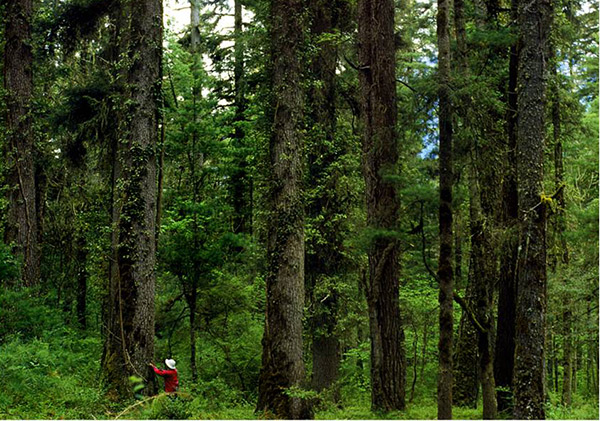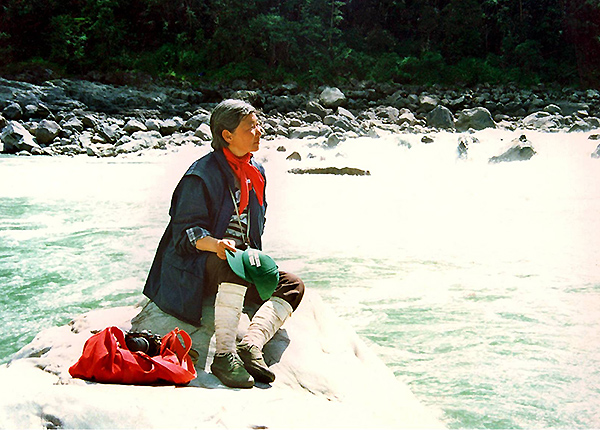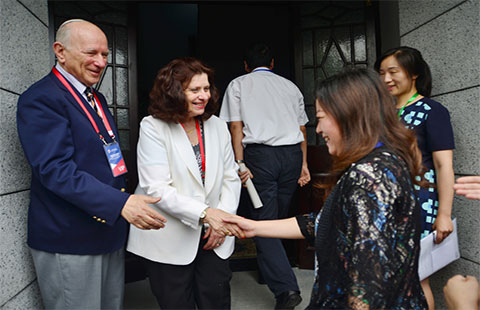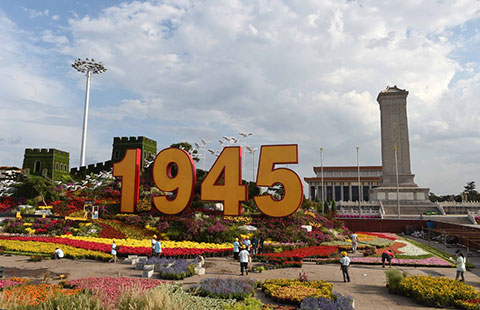Too hard to say goodbye to Tibet: China's Jane Goodall
Updated: 2015-08-27 09:21
By Chen Bei in Nyingchi(chinadaily.com.cn)
|
||||||||
 |
|
Xu Fengxiang (in red) makes a field research in the Gangxiang Spruce Forest in the 1980s. [Photo provided to chinadaily.com.cn] |
Love turned into obsession in 1978 when the then-47-year-old forest ecology university teacher bid farewell to her family in Nanjing, in the eastern province of Jiangsu, and headed for the Tibetan plateau to begin research into what she calls the four high-altitude ecosystems — glaciers, water, grasses, and forests, which are all effected by the harsh conditions, high altitudes, extreme winter cold and low oxygen levels that can result in aridity and desertification.
In the 18 years that followed until her retirement, Xu's footprints covered 130,000 km and more than 20 virgin forests in Tibet as she conducted field research. She visited base camp at Qomolangma, the world's highest mountain, known in the West as Mount Everest, three times, at ages 61, 70 and 78.
'China's Jane Goodall'
Located in Nyingchi's Bome county, the Gangxiang Spruce Forest has an area of 46 sq km, more than 61 percent of which is covered by spruce trees.
Without a seven-year field study that Xu conducted in the 1980s the forest would not have been measured and designated a nature reserve as a protection measure. In 2005, it was ranked by China National Geography Magazine as one of the country's "Top 10 Most Beautiful Forests".
"She is China's Jane Goodall," said Yang Ling, an environmental enthusiast in Beijing.
 |
|
Xu Fengxiang makes a field research on the Yarlung Zangbo River in the 1980s. [Photo provided to chinadaily.com.cn] |
In the past 12 or so years, Xu has published 11 academic books, introductions to the distribution of wild flowers, mountains, valleys, rivers and forests in Tibet.
Xu's recent trip to Nyingchi was her last because the low level of oxygen at high altitude can be detrimental to the health of seniors, and she has reluctantly conceded defeat. "It is really so hard to say goodbye," she said, as tears welled in her eyes.
"I bid farewell to the plateau many times since my retirement in 1995, but I flew back from Beijing again and again because of my love of nature and this landscape."
She has now been tasked with educating the younger generation about Tibet's fragile ecology and the need for protection. "I deliver lectures to students about 10 times a year, and introduce all the Tibetan species to them," she said.
"I'm happy to be a 'scientific preacher' for Tibet until the day I die — urging my fellow humans to protect the species on the plateau."
Contact the writer at: chenbei@chinadaily.com.cn
- Hungary scrambles to confront migrant influx
- Turkey to hold snap parliamentary election
- Caroline Kennedy used personal email for official business
- Czech appeals for closing Schengen external border
- DPRK says inter-Korean contact gives lesson to South Korea
- Trial starts for Chinese scholar expelled from Norway

 Hairdos steal the limelight at the Beijing World Championships
Hairdos steal the limelight at the Beijing World Championships
 Chorus of the PLA gears up for Sept 3 parade
Chorus of the PLA gears up for Sept 3 parade
 Iconic Jewish cafe 'White Horse Coffee' reopens for business
Iconic Jewish cafe 'White Horse Coffee' reopens for business
 Beijing int'l book fair opens new page
Beijing int'l book fair opens new page
 Top 10 Asia's richest tech billionaires in 2015
Top 10 Asia's richest tech billionaires in 2015
 Female honor guards train for military parade debut
Female honor guards train for military parade debut
 Floral replica of the Great Wall appears on Tian'anmen Square
Floral replica of the Great Wall appears on Tian'anmen Square
 Chinese long jumpers leap to history
Chinese long jumpers leap to history
Most Viewed
Editor's Picks

|

|

|

|

|

|
Today's Top News
Gunman had history of workplace issues
11 under probe and 12 detained over Tianjin blasts
War anniversary: Britons born in captivity, raised in freedom
Too hard to say goodbye to Tibet: China's Jane Goodall
Two US TV journalists fatally shot on air
Smaller cub died at National Zoo
Central bank lowers lending rate to ease debts
Officials on suspended death sentence face life behind bars
US Weekly

|

|






